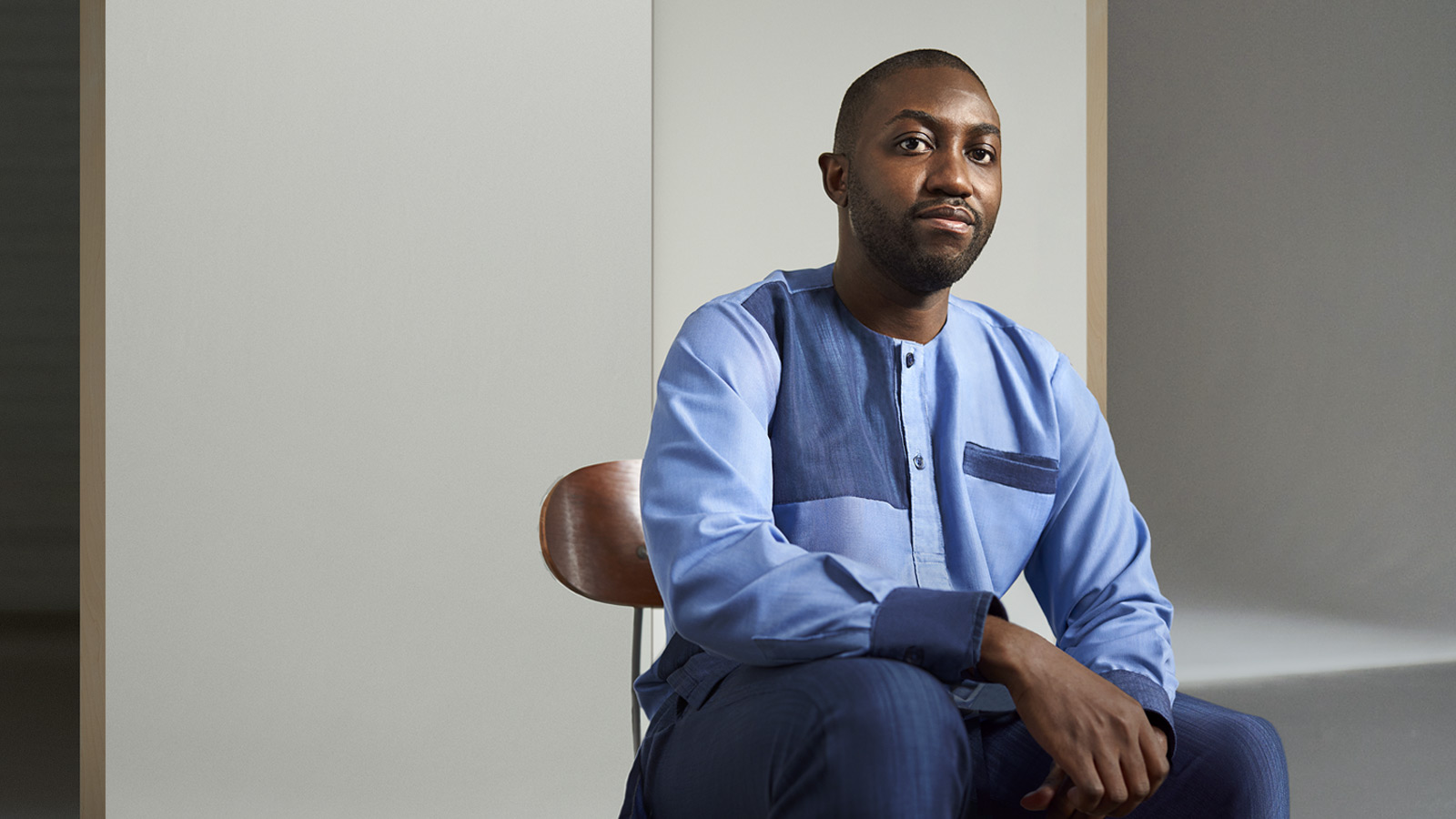George
Boateng
Applying AI to democratize education in Africa
”
George Boateng
CEO and Cofounder
SuaCode.ai

George Boateng
George Boateng is a problem solver and lifelong learner who cares about the well-being of other people. His ingenious solutions to small-scale obstacles have become visionary programs that benefit whole communities. George is co-founder and CEO of SuaCode.ai, a growing EdTech start-up that empowers young Africans to learn coding and AI using just their smartphones.
Computer scientist, engineer, educator, CEO — today you wear a lot of different hats, but how did you get started?
I was born and raised in Ghana, in Winneba, which is a small town along the coast. I went to high school in a different town called Cape Coast, and my family moved to Accra, the capital city, when I was in high school.
I was always interested in science, engineering, electronic gadgets — opening things up, trying to understand how they work. Building things to solve problems. Computers came later.
You like solving problems. What’s the first moment you realized you were good at it?
I went to boarding school in Ghana, and we’d wash our clothes by hand and hang them outside to dry. But I quickly realized that when you do this, your clothes get stolen. And I wasn’t okay with that.
I decided I was going to build a portable clothes-drying machine. It was my mission for the next two years. I read about how evaporation works, about how to build circuits, and finally, I built this device, and got it to work to some extent. I got some clothes dried and burned some along the way, too. But it worked pretty well.
You talk sometimes about engineering or coding as a creative process. What do you mean by that?
In terms of creativity, we are often trying to build something that doesn’t already exist. Sometimes you’re trying to solve a unique problem. So basically, learning to code entails this process of having a specific problem, thinking about different ways you might solve that problem, imagining how the solution could eventually work out. And all of these are components of being creative.
How did you decide that you wanted to teach other people how to solve problems?
At Dartmouth, I took a popular introductory engineering course called ENGS 21. It’s for students who have mostly never taken advanced engineering classes. We had to identify a problem, research and understand it — and then come up with a solution we could test. It was an amazing experience. So I thought, “We have a lot of problems in Ghana. I’m going to take this course back home with me.”
Project iSWEST was the result. We developed the program to teach Ghanian students about computer programming, innovation and how to approach real-world problems. I didn’t get any of the grants I applied for, unfortunately, but I was really passionate about bringing Project iSWEST to life, so I teamed up with my friends back home in Ghana, and we ran it basically with our own money for the first year. Eventually we got a grant from the Neukom Institute, which is associated with the computer science department at Dartmouth and Dartmouth’s Thayer School of Engineering.
Technology challenges at iSWEST led to you founding SuaCode.ai, right? How did that happen?
We had some laptops that were donated, but three years into running the iSWEST program, they had broken down. Then something interesting happened. One day my mentee’s laptop broke down while he was teaching the coding course, and all of a sudden he had the same problem as many of our students. That led him to discover a phone app that lets you basically run the same code examples we were teaching in the course. Only 25% of incoming students had laptops, but 100% had smartphones.
What did that mean for the project?
We decided right then to make everything run on a smartphone. And so basically students learned fundamental coding concepts and then eventually built a “Pong” game all on their phone. They could play it on the device they used to build it!
We also said, “Okay, this can’t just remain as part of Project iSWEST. Let’s make it a standalone program. Let’s put it online so that we can reach more Ghanaians and a lot of people across Africa,” because this problem of limited access to computers is not just in Ghana. It’s also across other African countries. And so that’s how SuaCode was born.
There’s an AI “teaching assistant” built into SuaCode. Why did you develop that feature?
A key aspect of the SuaCode course is the support that we give the students. But as we scaled, it became more difficult to give this support. For example, in the 2020 edition of the program, we had a 12-hour block each day where at least two facilitators were available — every day for eight weeks. That’s more than 1,000 hours of support for students, right? And we did it, but our vision is to teach millions across Africa to code. So that’s not a scalable model.
One of my areas of expertise is applied machine learning. So that’s where the idea of an AI teaching assistant came about. I took a course to learn the fundamentals of natural language processing so we could build one. And my co-founder named it Kwame, to honor the first president of Ghana, Dr. Kwame Nkrumah, and his Pan-African vision — because it’s all about helping young Africans to become empowered, creative innovators who can solve the problems around them.
What are the results like so far, and what’s next?
Some of my alums are actually currently in MIT, Yale, Columbia, Dartmouth, studying computer science or engineering. Some of my alums have gotten jobs across Africa. The idea is to definitely scale it beyond the thousands of students that we have. Eventually we want to have millions of people learning to code. But there’s this other aspect that I must confess I’m more excited about.
So, having built Kwame to answer questions, we realized that this AI can instantly support students in terms of helping them understand concepts, right? So we decided to extend Kwame and make Kwame work for science and other subjects. The grand vision is that with this AI, we are going to make it possible for students all across the continent to be able to ask Kwame questions related to their curriculum and then get instant answers — not just in English, right, but also in local languages across Africa. Just imagine. This is true democratization of education.

